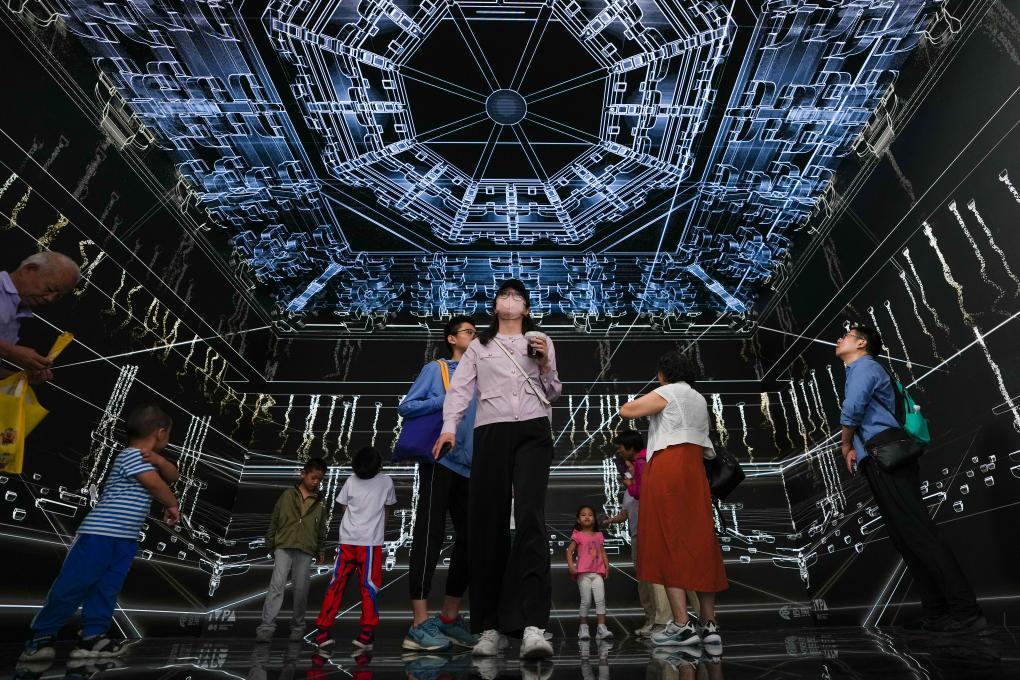




- BRNN
- BRI News
- BRNN News
- Database
Official Documents Polices and Regulations
Inter-government Documents International Cooperation BRI Countries
Business Guide Economic Data BRI Data
Trade
Investment Projects Latest projects
Cases - Content Pool

This photo taken on June 20, 2025 shows the cultural and creative products on display at a cafe in the SoReal sci-fi Park, transformed from No. 1 blast furnace of Shougang Park, in Shijingshan District of Beijing, capital of China. (Xinhua/Zheng Huansong)
BEIJING, Aug. 7 (Xinhua) -- What could an obsolete industrial furnace be repurposed for? Though many possibilities exist, transforming it into a sci-fi wonderland probably ranks among the most imaginative options.
This vision has become reality at Shougang Park, a former industrial site located in Beijing's western outskirts. One of the park's blast furnaces has been turned into an extended reality sci-fi attraction, drawing visitors to an area once dominated by heavy industry.
"By integrating the original industrial infrastructure and breakthrough technologies, we've successfully re-positioned the legacy industrial site as a premier tourist destination," Lyu Xiaozhuo, general manager of Shougang No. 1 Blast Furnace SoReal Sci-Fi Park, told Xinhua in an interview.
Riding the momentum of cutting-edge technologies, landmark destinations like the park are experiencing a dramatic renaissance, catalyzing a surge in China's cultural tourism consumption and injecting powerful impetus into the high-quality development of the world's second-largest economy.
TECH-ENABLED EXPERIENCE
Put on a headset and you find yourself faced with a myriad of dream journeys: interstellar cruises, horseback riding and even a trip to the west like the legendary one embarked upon by Monkey King Sun Wukong.
Powering such immersive experiences are cutting-edge technologies including edge computing, artificial intelligence (AI) and holographic imaging -- all part of the innovative growth drivers that China's policymakers call "new quality productive forces."
With the large-scale application of emerging technologies, the sci-fi park has emerged as a breakout success story since its launch last year, according to Lyu.
"We're seeing tremendous traction in the study tour and family travel segments," Lyu noted, while also highlighting that the park has garnered notable foreign interest -- with international visitors accounting for up to 10 percent of total summer traffic this year.
Commenting on the transformative impacts of technologies on China's cultural landscape, renowned Chinese sci-fi writer Liu Cixin said these innovations are "not only enriching the consumer experience, but also pioneering an entirely new era for cultural tourism."
Similar transformations can be seen across the country. In northeast China's Heilongjiang Province, for example, the Harbin Ice-Snow World has deployed cutting-edge digital interactive light installations during the summer vacation, while in east China metropolis Shanghai, a revolution-themed memorial site has leveraged virtual reality technology to deliver visitors an immersive historical experience.
Such tech-culture integration has breathed fresh life into the cultural sector. According to China Tourism Academy, generative AI and vertical large language models are fueling digital innovation across the cultural sphere -- offering visitors improved interactive experiences, diversified immersive options and more personalized services.

Visitors immerse themselves in a digital art exhibition during the 2024 China International Fair for Trade in Services (CIFTIS) in the Cultural &Tourism Service thematic exhibition area at the Shougang Park in Beijing, capital of China, Sept. 15, 2024. (Xinhua/Ju Huanzong)
GROWTH TAILWINDS
Lyu has attributed the success of the sci-fi park and the burgeoning cultural consumption market to a nurturing policy ecosystem, robust consumer market and the power of technological advances.
"We've been a big beneficiary of government policies," Lyu said. Notably, she added that government support has been granted in multiple forms and sustained in every stage of the park's development.
In a key policy document outlining cultural development for 2021-2025, China designated cutting-edge technologies as a strategic cornerstone for reshaping its cultural development paradigm.
At the local level, authorities have been expediting such integration through targeted policies and via the establishment of cultural parks and innovation hubs. Beijing, for instance, has fostered a vibrant ecosystem of over 130 sci-fi creation and tech innovation enterprises at its Zhongguancun sci-fi innovation hub, which now delivers a broad spectrum of next-generation technological services.
Solid market demand has underpinned this transformation. Buoyed by new consumption scenarios, China's consumer spending on services has emerged as a bright spot. Retail sales of services rose 5.3 percent year on year during the first half of 2025 -- outpacing the growth of goods sales.
Technology remains pivotal. According to Lyu, technologies deployed in the park were developed through strategic partnerships with telecommunications leaders such as Qualcomm and China Mobile.
"These technologies represent eight years of R&D investment and multiple iteration cycles. We will continue to enhance our technology platform and product offerings," she said, emphasizing that over half of the company's employees are dedicated to R&D and design.
ROSY PROSPECTS
Despite economic uncertainties, Lyu maintained a bullish outlook on the long-term growth trajectory of the tech-powered cultural tourism market.
"China's domestic market has presented a fertile ground for our business and we are quite confident about the future performance of the park," Lyu said.
China's immersive cultural tourism segment surged 24.1 percent year on year in 2024 -- underscoring the enormous potential in the tech-driven cultural consumption market, said Beijing Academy of Science and Technology.
Lyu revealed that her firm plans to open more attractions at the sci-fi park, while stepping up branding and sharpening its technological competitiveness.
Ambitious about international expansion, she highlighted substantial overseas opportunities for Chinese cultural enterprises -- identifying Thailand and Japan as prime target markets for the company's global rollout.
Chinese cultural exports have entered a new phase, featuring premium content delivery, technology-enabled capabilities and collaborative ecosystem development, said Wei Pengju, senior researcher at the Central University of Finance and Economics in Beijing.

Tel:86-10-65363107, 86-10-65368220, 86-10-65363106